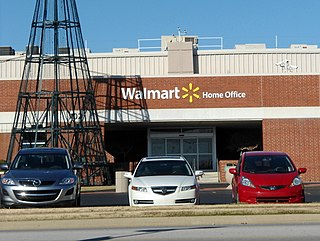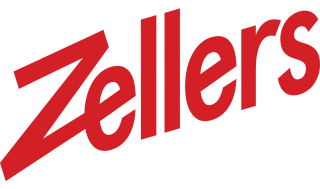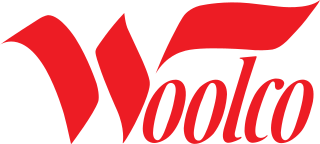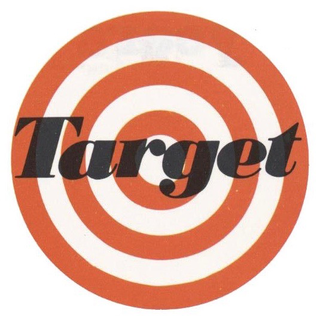Related Research Articles

Walmart Inc. is an American multinational retail corporation that operates a chain of hypermarkets, discount department stores, and grocery stores in the United States, headquartered in Bentonville, Arkansas. The company was founded by brothers Sam and James "Bud" Walton in nearby Rogers, Arkansas in 1962 and incorporated under Delaware General Corporation Law on October 31, 1969. It also owns and operates Sam's Club retail warehouses.

Samuel Moore Walton was an American business magnate best known for founding the retailers Walmart and Sam's Club, which he started in 1962 and 1983 respectively. Wal-Mart Stores Inc. grew to be the world's largest corporation by revenue as well as the biggest private employer in the world. For a period of time, Walton was the richest person in the United States. His family has remained the richest family in the U.S. for several consecutive years, with a net worth of around US$240.6 billion as of January 2022.

Asda Stores Ltd. is a British supermarket chain. Its headquarters are in Leeds, England. The company was founded in 1949 when the Asquith family merged their retail business with the Associated Dairies company of Yorkshire. It expanded into Southern England during the 1970s and 1980s, and acquired Allied Carpets, 61 large Gateway Supermarkets and other businesses, such as MFI Group. It sold these acquisitions during the 1990s to concentrate on the supermarkets. It was listed on the London Stock Exchange until 1999 when it was acquired by Walmart for £6.7 billion. Asda was the second-largest supermarket chain in the United Kingdom between 2003 and 2014 by market share, at which point it fell into third place.

Canadian Tire Corporation, Limited is a Canadian retail company which operates in the automotive, hardware, sports, leisure and housewares sectors. Its Canadian operations include: Canadian Tire, Mark's, FGL Sports, PartSource, and the Canadian operations of Party City. Canadian Tire acquired the Norwegian clothing and textile company Helly Hansen from the Ontario Teachers' Pension Plan in 2018.

Zellers was a Canadian discount store chain founded by Walter P. Zeller in 1931. It was acquired by the Hudson's Bay Company (HBC) in 1978, and after a series of acquisitions and expansions, peaked with 350 locations in 1999. However, fierce competition and an inability to adapt during the retail apocalypse resulted in Zellers losing significant ground in the 2000s.

A variety store is a retail store that sells general merchandise, such as apparel, auto parts, dry goods, toys, hardware, furniture, and a selection of groceries. It usually sells them at discounted prices, sometimes at one or several fixed price points, such as one dollar, or historically, five and ten cents. Variety stores, as a category, are different from general merchandise superstores, hypermarkets, warehouse clubs, grocery stores, or department stores.

Woolco was an American-based discount retail chain. It was founded in 1962 in Columbus, Ohio, by the F. W. Woolworth Company. It was a full-line discount department store unlike the five-and-dime Woolworth stores which operated at the time. At its peak, Woolco had hundreds of stores in the US, as well as in Canada and the United Kingdom. While the American stores were closed in 1983, the chain remained active in Canada until it was sold in 1994 to rival Walmart, which was looking to enter the Canadian market. All of the former UK Woolco stores were sold by Kingfisher, which had bought the UK Woolworth business, to Gateway which subsequently sold them to Asda.
A discount store or discounter offers a retail format in which products are sold at prices that are in principle lower than an actual or supposed "full retail price". Discounters rely on bulk purchasing and efficient distribution to keep down costs.

Caldor, Inc. was a discount department store chain founded in 1951 by husband and wife Carl and Dorothy Bennett. Referred to by many as "the Bloomingdale's of discounting," Caldor grew from a second story "Walk-Up-&-Save" operation in Port Chester, New York, into a regional retailing giant. Its stores were earning over $1 billion in sales by the time Carl Bennett retired in 1985, by which time Caldor was a subsidiary of Associated Dry Goods.
Ben Franklin is a chain of five and dime and arts and crafts stores found primarily in small towns throughout the United States, currently owned by Promotions Unlimited of Mount Pleasant, Wisconsin. They are organized using a franchise system, with individual stores owned by independent proprietors. It was perhaps the first retail franchise, starting in 1927. They are named after Benjamin Franklin, taking a cue in their merchandise offerings from Franklin's saying, "A penny saved is a penny earned."

Giant Eagle, Inc. and stylized as giant eagle) is an American supermarket chain with stores in Pennsylvania, Ohio, West Virginia, Indiana, and Maryland. The company was founded in 1918 in Pittsburgh, Pennsylvania, and incorporated on August 31, 1931. Supermarket News ranked Giant Eagle 21st on the "Top 75 North American Food Retailers" based on sales of $11 billion. In 2021, it was the 36th-largest privately held company, as determined by Forbes. Based on 2005 revenue, Giant Eagle is the 49th-largest retailer in the United States. As of summer 2014, the company had approximately $9.9 billion in annual sales. As of spring 2023, Giant Eagle, Inc. had 493 stores across the portfolio: 211 supermarkets 8 standalone pharmacies, 274 fuel station/convenience stores under the GetGo banner, and one standalone car wash under the WetGo banner. The company is headquartered in an office park in the Pittsburgh suburb of O'Hara Township.

Giant Tiger Stores Limited is a Canadian discount store chain which operates over 260 stores across Canada. The company's stores operate under the Giant Tiger banner in Alberta, Manitoba, New Brunswick, Nova Scotia, Ontario, Prince Edward Island and Saskatchewan; under the GTExpress and Scott's Discount banners in Ontario and under the Tigre Géant banner in Quebec.
Consumers Distributing was a catalogue store in Canada and the United States that operated from 1957 to 1996. At its peak, the company operated 243 outlets in Canada and 217 in the United States, including stores in every province in Canada and in the states of New Hampshire, Massachusetts, Connecticut, New York, New Jersey, Pennsylvania, Maryland, California and Nevada.

A big-box store is a physically large retail establishment, usually part of a chain of stores. The term sometimes also refers, by extension, to the company that operates the store. The term "big-box" references the typical appearance of buildings occupied by such stores.
Service Merchandise was a retail chain of catalog showrooms carrying jewelry, toys, sporting goods, and electronics. The company, which first began in 1934 as a five-and-dime store, was in existence for 68 years before ceasing operations in 2002.
Walmart Canada is a Canadian retail corporation and the subsidiary of U.S.-based multinational retail conglomerate Walmart. Headquartered in Mississauga, Ontario, it was founded on March 17, 1994, with the purchase of the Woolco Canada chain from the F. W. Woolworth Company.

E. J. Korvette, also known as Korvettes, was an American chain of discount department stores, founded in 1948 in New York City. It was one of the first department stores to challenge the suggested retail price provisions of anti-discounting statutes. Founded by World War II veteran Eugene Ferkauf and his friend, Joe Zwillenberg, E. J. Korvette did much to define the idea of a discount department store. It displaced earlier five and dime retailers and preceded later discount stores, like Walmart, and warehouse clubs such as Costco.

Target Canada Co. was the Canadian subsidiary of the Target Corporation, the eighth-largest retailer in the United States. Formerly headquartered in Mississauga, Ontario, the subsidiary was formed with the acquisition of Zellers store leases from the Hudson's Bay Company (HBC) in January 2011. Target Canada opened its first store in March 2013, and was operating 133 locations by January 2015. Its main competition included Walmart Canada, Loblaws, Shoppers Drug Mart, and Canadian Tire.

The history of Target Corporation first began in 1902 by George Dayton. The company was originally named Goodfellow Dry Goods in June 1902 before being renamed the Dayton's Dry Goods Company in 1903 and later the Dayton Company in 1910. The first Target store opened in Roseville, Minnesota in 1962 while the parent company was renamed the Dayton Corporation in 1967. It became the Dayton-Hudson Corporation after merging with the J.L. Hudson Company in 1969 and held ownership of several department store chains including Dayton's, Hudson's, Marshall Field's, and Mervyn's. In 2000, the Dayton-Hudson Corporation was renamed to Target Corporation.
References
- ↑ "About Giant Tiger / History". gianttiger.com. Archived from the original on October 28, 2010. Retrieved September 28, 2009.
- 1 2 3 4 5 Laurie McBurney, "Giant Tiger roars loud in the discount jungle". Ottawa Citizen, November 29, 1999, p. D3.
- ↑ "Profiting from the bargain basement," in The Enterpriser, (Ottawa), vol. 4, no. 5 (1981).
- 1 2 3 Hugh Paterson, "A retail giant earns its stripes", Edmonton Journal, May 10, 2010.
- 1 2 3 John Schofield, "Gordon Reid: Lifetime Achievement Award", in Canadian Retailer, July/August 2010, p. 47.
- 1 2 3 4 5 6 7 8 Gordon Pitts, "Tightwad philosophy keeps Tiger running", Ottawa Citizen, September 27, 1980.
- 1 2 3 Kristin Goff, "Canada's national Tiger", Ottawa Citizen, Nov. 17, 2007.
- ↑ Mark McNeil, "Giant Tiger built on lots of cheap goods". Hamilton Spectator Oct. 27, 2001, p. B1, B2.
- ↑ Rita Zekas, "Store Gazing: Giant Tiger puts the bite on prices", Toronto Star, June 18, 2010.
- ↑ Richard Roik, "Roaring Start for prez." Ottawa Sun, Sept. 15, 1999, p. 38.
- 1 2 3 Vito Pilieci, "New CEO grabs Tiger by the tail", Ottawa Citizen, October 15, 2010.
- ↑ "Discount retailer Giant Tiger exploring options, including possible sale".
- ↑ Reid, Scott. "Giant Tiger Warehouse Grand Opening". scottreid.ca. Scott Reid. Retrieved 28 March 2016.
- ↑ "Giant Tiger founder Gordon Reid has died at 89". CTV News. 10 July 2023. Retrieved 10 July 2023.